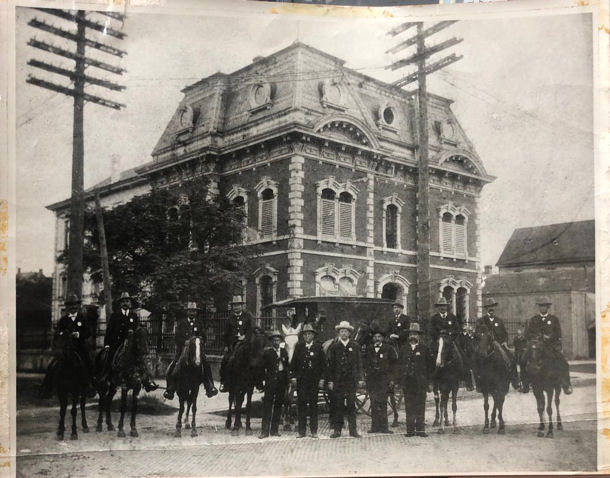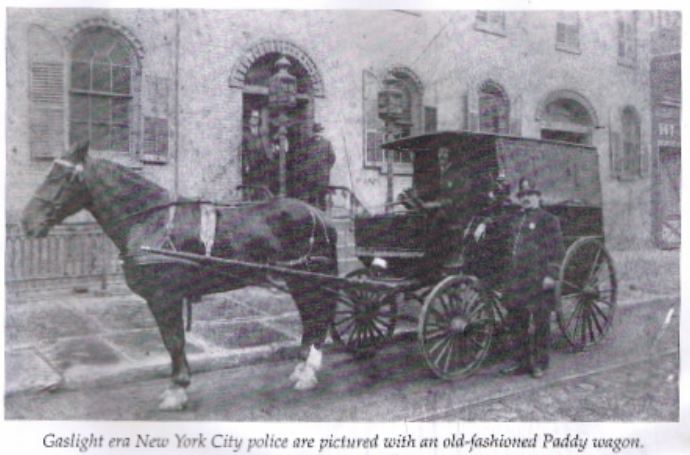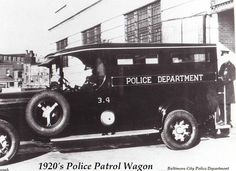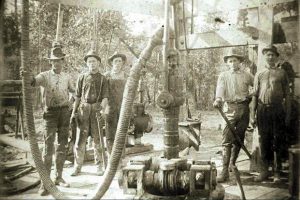For years, Houston had three newspapers: The Houston Chronicle, The Houston Press, and The Houston Post. Each had its own personality and news slant. Today, The Houston Chronicle is the last standing newspaper in Houston.
The eldest of the three, The Houston Post, which dated its founding back 111 years to 1884, unceremoniously closed its doors suddenly on April 18, 1995. On the tenth anniversary of its closing, 2005, Lynn Ashby, a long time columnist for the Post, described that closing. I recently found his article and some identified pictures of “posties” as they called themselves. Ashby’s description reminds me of the sudden closing of Enron in 2007 and the devastation to its employees, unceremoniously escorted from the building.
I do not know now how to use this information, but it seems important that it be preserved and accessible. Posties counted for something important. We roll on day to day listening only to the Now with breathless announcements: “The sky is falling! Be afraid!” Yet, if we keep just a sideways glance on history, we know that clouds drift in and out, but the sky does not fall. Tragedies happen, good people get hurt, but the collective We recover with a chance to make it right.
Category: My Thoughts
Just sayin’
Native American Treaties
Hundreds of Native American treaties have been scanned and are freely available online, for the first time, through the National Archives Catalog. See the IDA Treaties Explorer (Indigenous Digital Archive).
Paddy Wagon
I need a picture of the type of Harris County police vehicle used to transport a person to the courthouse jail to await a hearing in late 1927. I got a good idea of what I might be looking for on a general Google search; however, none of the images were in Texas or Houston area.
In the process, I found a link to the Houston Police Department Museum, HPD.Museum@houstonpolice.org . Museum and Library People are my favorite people. They always know how to find stuff, and they always respond to requests. I received this photo labeled simply 1920s. I am unsure now whether a horse drawn paddy wagon was still being used in Houston in 1927 and have not identified the building. However, the photo is awesome.

The paddy wagon appears to be the same as this New York photo from Google search:

I suspect strongly that the horse drawn paddy wagon was no longer used in 1927 New York or Houston. Downtown Houston was very crowded with cars and street cars, although horses were still being used in rural areas.
The Houston police transport vehicle in 1927, I think, would be more like the following, but I still need verification:

Grammar: Definition

Lynch/Lynching
Our language and our history are being manipulated as blatant propaganda tools, and I resent it. Let’s begin with that.
Much is being made today on MSNBC, which is what is running here, but the same is probably true for CNN, about the horror of Trump using “yet another racist term”: lynching. He referred to attacks on him as a lynching. The “commentators” on tv “news” programs, one after another, are bringing in one activist after another, to give us history lessons on the meaning of lynching, which, as defined by their expert, is the unlawful hanging of Blacks in the United States. One expert asked, “How dare someone apply the word to himself who is not a U.S. Black?”
Before we accept the label of “racist” to a somewhat common, colloquial word, let us remember that words have actual meanings and actual histories that can be researched. A dictionary is a good starting place.
Dictionary.com is an easy to use tool for looking up the definition of a word, seeing a brief etymology (i.e., history) of the word, and samples of the word used in actual sentences. Bookmark it in your browser or put a shortcut on your phone screen for quick access.
The following information about the word lynch/lynching is excerpted from Dictionary.com:
“verb (used with object)
to put to death, especially by hanging, by mob action and without legal authority.
“(tr) (of a mob) to punish (a person) for some supposed offence by hanging without a trial
“Lynching can also refer to any kind of vigilante justice or extrajudicial murder, typically of a member of a minority group. For instance, the Indian Supreme Court ruled in July 2018 that “mob lynching is a crime no matter what the motive is” in response to “cow vigilantism”—the murder of those who eat cows, which are sacred in the Hindu religion.
“Lynching is also sometimes figuratively used when someone is felt to be wrongly persecuted, as if hounded by a metaphorical lynch mob. ”
Example of Metaphorical Use–“These political attacks on me are nothing but a lynching.”
(Metaphors are used to compare, often with exaggeration: “He threw me a spitball with that proposal.”)
WORD ORIGIN FOR LYNCH
“…probably after Charles Lynch (1736–96), Virginia justice of the peace, who presided over extralegal trials of Tories during the American War of Independence
“Others claim that the name comes from a different Virginian active around the same time, one Charles Lynch, who is also associated with a “lynch law” similarly connected to the suppression and incarceration of Loyalists. The city of Lynchburg, Virginia, is likely named for his brother, John Lynch.
“Various ethnic groups in the U.S. were victims of lynching, including Mexicans, Chinese, African-Americans, and European-Americans.” (My note: Yes, the mob lynched some as a result of prejudice alone; but accused horse and cattle thieves were lynched, murderers were lynched, rapists were lynched.)
IN SUMMARY
I believe in law. Actual historical lynchings and contemporary lynchings are mob ruled, meaning emotion-ruled, meaning irrational-ruled. Mob rule cannot be tolerated in a law based society.
That said, language is a living entity. Words morph into living metaphors. So, I may very well say, “I feel a lynching coming on.” Meaning, I feel an unjust verbal attack coming my way. The attack is not going to hang me from a tree. The attack will fling unending, unsubstantiated accusations my way, day in, day out until I am silenced.
The obvious propagandizing of our language and our history is disturbing, but I am happy to say that, at the least, I know the meaning and the history of the word, lynch/lynching.
War Songs
Randomly searching through my collection of mp3 songs, I saw a title that I had not heard in a very long time. “Over There” by Billy Murray was popular during WWI. I was surprised by the unabashed patriotism and optimism of the song.
I am mentally scanning the pop songs of U.S.A. wars of other times and places. The War of Independence had “Yankee Doodle.” The Civil War North had “The Battle Cry of Freedom” and “The Battle Hymn of the Republic.” WWII had “Praise the Lord and Pass the Ammunition.” Sure, I can research the list and find sad songs of the same periods, and I can argue the point that pop songs and pop movies were created for propaganda purposes to motivate the public to support war, but what strikes me now is the outstanding popularity of these upbeat, positive war songs through almost two centuries.
I am now thinking backward from today. We have been at war since 2001. I can think of no patriotic, much less optimistic, war songs for this contemporary period. The VietNam Conflict of the 1960s, now referred to as the VietNam War, produced powerful protest songs against the war, but I recall not one patriotic war song. Ditto for the Korean Conflict of the 1950s, now referred to as the Korean War.
Yes, we have entered a new age and the sands are shifting under our steps, but the silence surrounding our warriors today is disturbing. Perhaps, this silence and emotional detachment is a necessary prelude to the advent of robotic soldiers. They certainly will not benefit from patriotic songs.
Old News
Darn the wheel of the world! Why must it continually turn over? Where is the reverse gear? (Jack London)
Over the decades I have watched acres and acres and acres, ad infinitum, of fully grown forests levelled to the bare ground that is then covered with cement, private home subdivisions, sprawling apartment units, little and big shopping centers and malls. Trees weep; people shake their heads and move on. I have recently seen a few articles about the diminishing CO2 levels, and the emotional cry, “Something must be done!” I have read no article that states, “We must stop cutting down the forests. Trees inhale CO2 and exhale oxygen.” It is literally elementary education–or it used to be.
Reading history reminds me that all is either repetition or stagnation. There is no point in going emotionally ballistic over the daily “new” tragedies directly related to “old news” like the following. (Note: The second paragraph is the clincher.)
from Popular Health Almanac 1876-1877
“Destruction of forests and woodlands.—The rapid and improvident destruction of our forests and woodlands, and the prevailing indifference displayed on the subject of their preservation and cultivation, has become an almost stereotyped theme of warning and regret. It is demonstrable that the immediate consequences of this improvidence are an inconstancy and diminution of the rainfall, and of the water supply of the great rivers and lakes, and hence a general deterioration of climate, to say nothing of a host of more remote and complex evils that inevitably follow in course of time, and largely affect the destiny of men and of countries. These consequences have been abundantly realized in the desolation of many once fertile districts of Asia, Africa, and Europe, and have caused the enactment and enforcement of wise laws for the preservation and management of the forests and woodlands in most European countries.
“The destruction of timber land going on in our continent on a scale of unparalleled magnitude cannot fail, in time, perhaps slowly, but no less surely, to affect the climate, the salubrity, the rainfall and water supply of large districts of our country also; and it may then cost our children millions of dollars to remedy our offense against the balance of nature, which once could have been averted without expense, by wisdom and economy.”
Houston Roughnecks
A few days ago, announcements came from all the sports commentators: The new XFL Houston team has chosen its name–The Houston Roughnecks. What a great name, I thought. How appropriate for Houston. Alas, the commentator that I heard added, “I don’t know why they would choose ‘roughneck’ for a name, but it sounds good.” Perhaps he came from out of state and is still learning our history. Roughnecks, like trail riders in the past and like football players today, were highly respected for their toughness and skill in getting the job done.
In January 1901 the great world game changer, the Spindletop, blew its top and spewed black gold–oil–into the air. The oil fields around Beaumont had been searching for the vein for a few years. The guys who worked the oil field and its oil derricks were called “roughnecks” because it was rough work. Here is a picture of the Spindletop roughnecks:

Learn more about Spindletop and the beginning of the oil industry here: Handbook of Texas Online, Robert Wooster and Christine Moor Sanders, “SPINDLETOP OILFIELD,” http://www.tshaonline.org/handbook/online/articles/dos03.
Hello.
Research is what I'm doing when I don't know what I am doing (Wernher von Braun).
Research It! is my personal space to roll around ideas and collect files. See the About section for more info.
